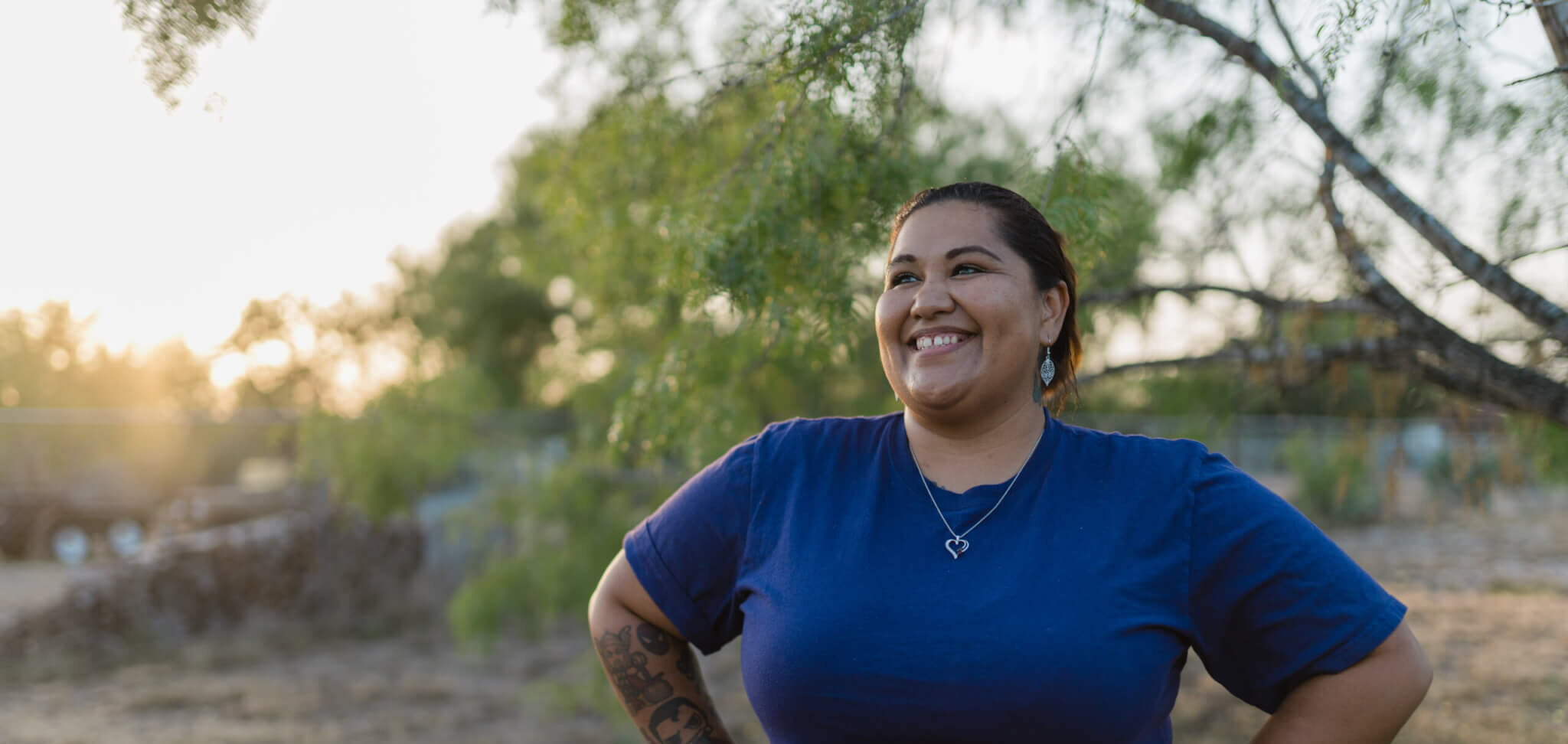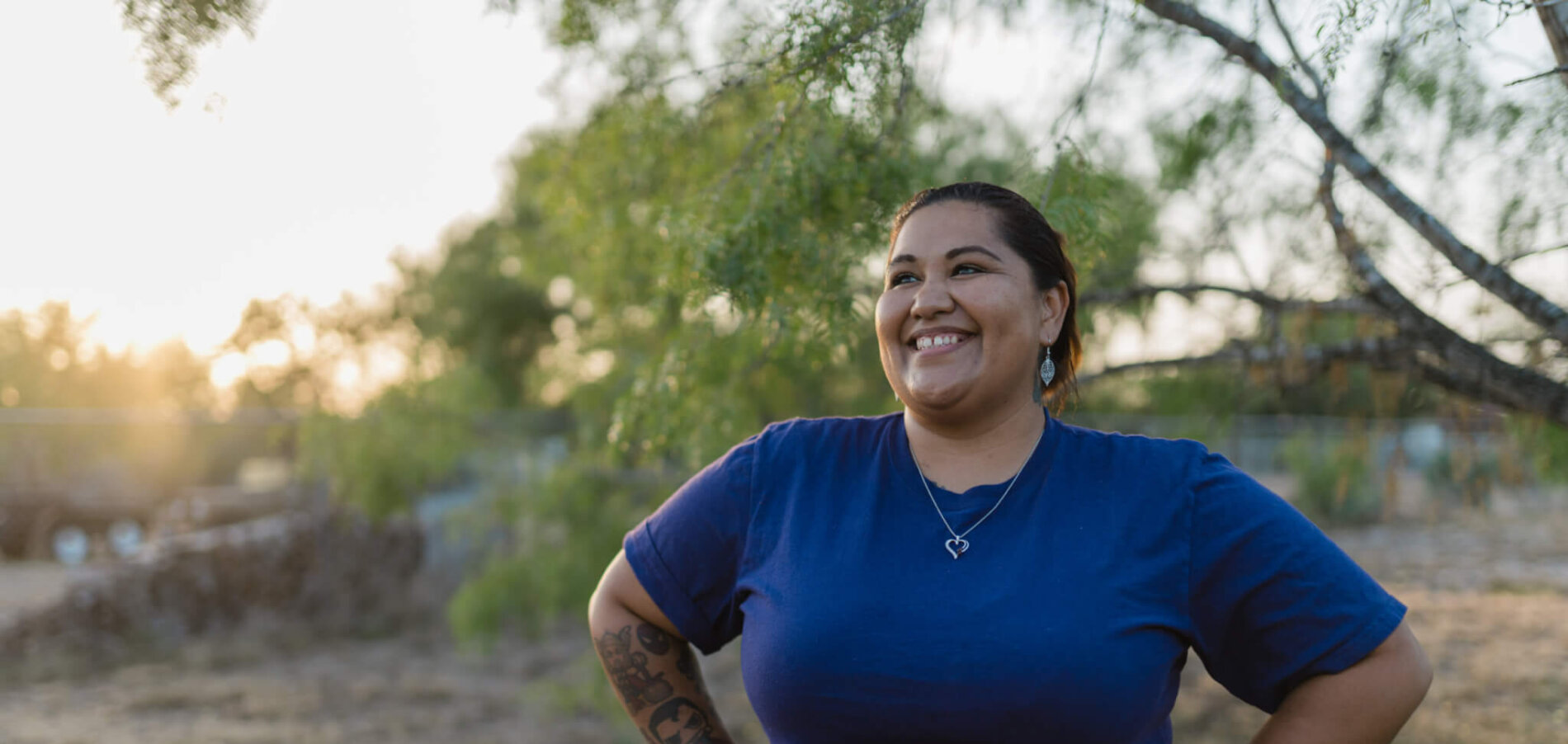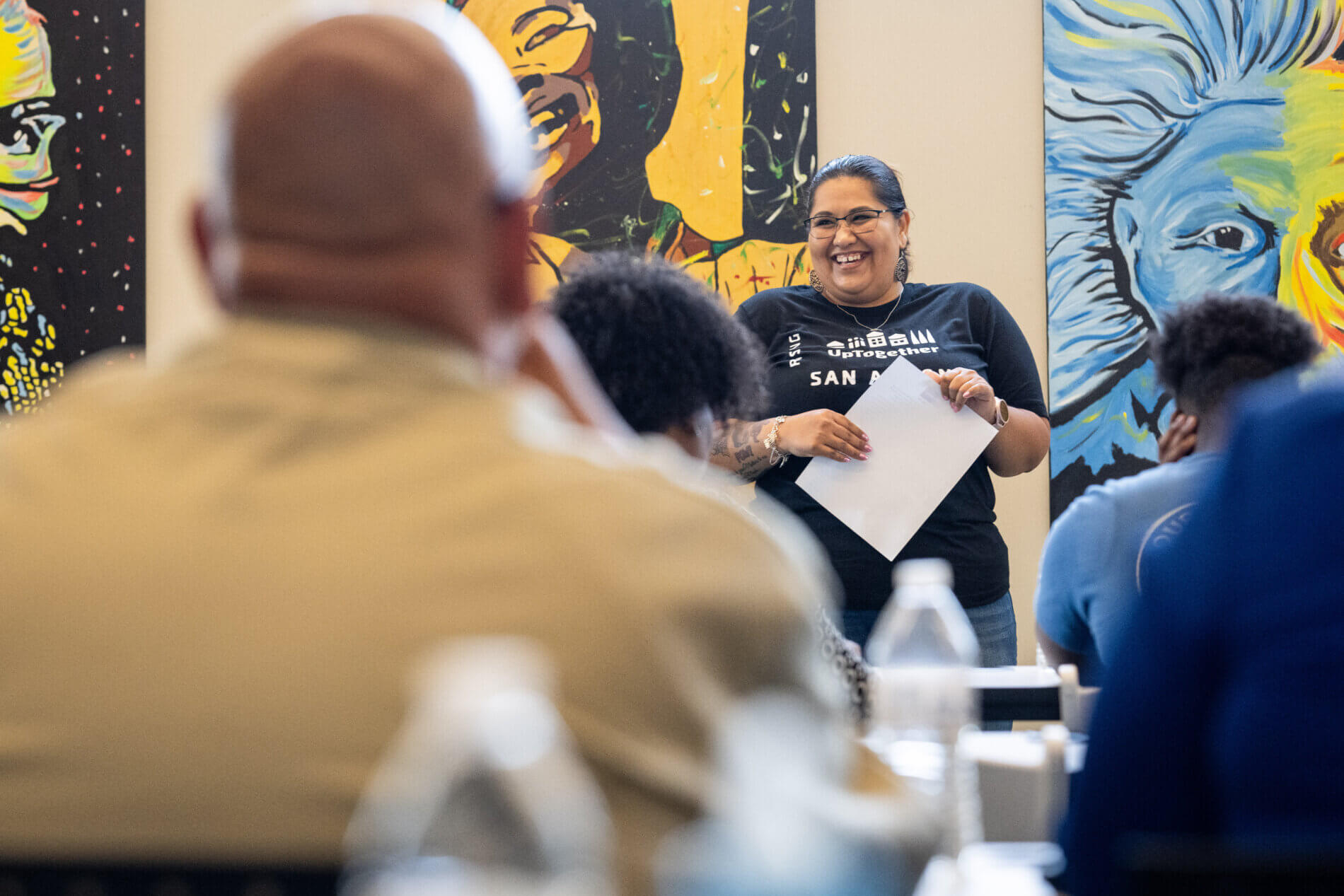

| Over the past decade, Christina Gonzalez has spent a lot of time on the phone, in doctor’s offices, and in the hospital trying to get people to listen. |
|---|
Throughout multiple complex medical emergencies, she’s encountered doctors who take her seriously as a partner in her own health—and those who don’t. In some seasons, she’s been able to string together public benefits and part-time work to give her consistent access to the care she needs. In other seasons, her care has been constrained by what she can afford.
It’s been a long, difficult road. But Gonzalez’s eyes still twinkle with a sense of purpose.
She speaks confidently, with a generous laugh, and delivers the often harrowing details of her story with a matter-of-fact grace. Now, in what limited work she can do, Gonzalez has decided to look for jobs that allow her to be the listening ear she’s so often wished she had.
“I want to help as much as I can,” she said. “even though I’m in a good place now, I went through hell for so many years. The hell of people not listening to me.”
| “Even though I’m in a good place now, I went through hell for so many years. The hell of people not listening to me.” |
|---|
Gonzalez grew up on the South Side of San Antonio, in a house her dad built himself. He wasn’t an architect or a contractor, and he used what materials he could afford, so the house—which Gonzalez is now buying from him—has needed lots of updates to accommodate her family.
They use energy as efficiently as possible and allocate space wisely. She’s thankful to be buying from family, paying in reasonable installments while rents soar around her. She’s happy on her sunny patch of the South Texas plains, even though the South Side is still in many ways segregated from the rest of the city, with fewer grocery stores, less retail, and most relevant to her life, far less access to health care.
Officials celebrated in 2022 when University Health System announced that it would bring a second hospital to the South Side. But a year later, in May 2023, the Texas Vista Medical Center permanently closed. Many on the South Side were already traveling 40 minutes or more north to the Medical Center to see specialists or for major medical issues. Now, emergency rooms and more routine procedures will be limited as well.
Prior to 2014, Gonzalez might not have noticed the disparity much. At age 31, she was a healthy working mother of four, working in maintenance for a movie theater and local businesses. She was team mom for her kids’ sports teams, and regularly undertook home improvement projects.
When she started feeling run down, at first it seemed almost natural. But then the exhaustion started to take over, like an insatiable ghost absorbing her energy. She cut back her shifts, stopped volunteering, and slept … a lot. Some mornings her husband couldn’t wake her up, which was their first sign that something more than just motherhood was zapping Gonzalez’s energy.
“I went from being completely healthy to not being able to do anything,” she said.
Then she passed out while driving, just managing to coast to a stop in the median. When she woke up, she drove straight to the hospital, where a doctor told her in no uncertain terms that she needed a pacemaker, and she needed it soon.
A normal resting heart rate is 60 to 100 beats per minute. Hers hovered in the 40s while moving, dropping in the 20s when she slept. One day, the doctor warned, she wouldn’t wake up.
The pacemaker set off a whole series of complications, leading to panic attacks, 9-1-1 calls, and depression and suicidal ideation. Figuring she would never harm herself in or near her church, she started sleeping in her car in her church’s parking lot to keep herself from acting on those thoughts.
“I had this urge to do it, to end the suffering,” she said, “but I didn’t want to do it.”
Just as Gonzalez adjusted to life with a pacemaker, in 2017 she was diagnosed with uterine cancer, requiring a hysterectomy.
Life was almost back to normal in 2019, when her arms and legs started feeling weak. She wondered if it was the pacemaker, but a checkup found it fully functional. But the weakness continued to grow, and she found herself back where she’d been in 2014—now so weak she couldn’t even brush her daughter’s hair.
Doctors diagnosed Gonzalez with an aggressive autoimmune disorder. She was now dependent on regular infusions to stay mobile, with a Medicare co-pay around $900 a month. For Medicaid to cover that co-pay, she had to keep her income low—the gap between qualifying for Medicaid and making enough money to cover an extra $900 per month payment was not something she could cover, especially when picking up extra hours aggravated her flare ups. This is a known problem with American benefits programs, sometimes called the “benefits cliff.”
From 2014 to 2020, Gonzalez was formally diagnosed with 16 medical conditions and three mental health issues after having the pacemaker put in.
And all of that has meant a lot of explaining—and a lot of hard efforts at making herself heard.

One new specialist dismissed her concerns about a blood clot, which then nearly killed her. Another told her to quit her infusions and let her system cleanse itself, which sent her into a full relapse. These near disasters confirmed to her that she would have to be her own best advocate, and she needed to trust her intuition when she felt like doctors’ diagnoses were off.
Hanging over all the medical issues has been the financial strain of trying to make ends meet and give her four kids the kind of childhood she dreams of for them.
In 2020, a friend told her about UpTogether, a nonprofit that works with local philanthropies to distribute unrestricted cash to families like hers. She enrolled, and over 27 months (about 2 and a half years) her family received $5,100 in direct deposits to spend on groceries, gas, kids’ sports equipment, whatever they needed.
For someone whose major bills depend on her income staying so low that the smaller, monthly bills are difficult to pay, unrestricted cash is the best way to help.
| DESPITE ALL SHE’S BEEN THROUGH, SHE HASN’T LOST THE LIGHT IN HER EYES. SHE’S ENGAGING GENEROUS WITH A LAUGH. |
|---|
Earlier this year, Gonzalez heard about an opportunity to work with UpTogether to help with a new phase of their “Cash without Conditions” program, interviewing families to get feedback on how the program was working out for them, and helping the nonprofit align its services to the actual families it serves.
Gonzalez jumped at the chance. She could do the job from home, and the hours and pay rate would not put her over the income limit to interfere with Medicare or Medicaid. Plus, she reasoned, she could finally put some of these advocacy skills to use for others.
She’s been able to find other similar contract gigs that allow her to maintain the careful balance of income and hours, and a flexible enough schedule to accommodate her ongoing health care regimen.
Talking with her, it’s easy to see why she gets the gigs: despite all she’s been through, Gonzalez hasn’t lost the light in her eyes. She’s engaging and warm, generous with a laugh. She’s learned to communicate clearly and get right to the point—a skill she’s honed in emergency rooms—and she has a natural ability to invite others into conversation and encourage feedback.
“When I hear my own story, I cry,” Gonzalez said. “But I’m not going through this for me. I’m going through it for other people.”
| CASH WITHOUT CONDITIONS—AND WITH RELATIONSHIP
Christina Gonzalez is a community liaison with UpTogether, a national organization that the H. E. Butt Foundation has been partnering with to support San Antonio families since 2020. UpTogether focuses on families who are experiencing economic hardship. Their approach is summed up in three Cs: COMMUNITY: UpTogether families bond together, building and strengthening their social network. CAPITAL: Families receive unrestricted cash grants that allow them to invest in their own lives. CHOICE: People are experts in their own lives and are capable of making strong decisions for their families. This summer, we worked with UpTogether to launch a new initiative in San Antonio—25 families across the city working together to improve their lives while receiving $500 per month for 18 months. There are no restrictions or reporting requirements on the funds—families can use them to do whatever they need to do. Using this model across the nation, UpTogether has seen many families climb up and out of economic hardship. We’ll keep you updated on the families in UpTogether initiative in San Antonio. |
|---|
When this SAISD student found inspiration in nature, he wanted to pass along his passion into his city.